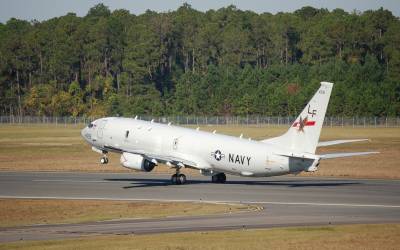Americas Boeing won a $10 million modification, which adds scope to procure ancillary support for three Navy P-8A aircraft and one retrofit kit for the Royal Australian Air Force (RAAF) P-8A aircraft with Increment Three Engineering Change Proposal Six Capabilities....
Legal Articles
P-8 Poseidon MMA: Long-Range Maritime Patrol, and More
P-8A Poseidon (click to view full) Maritime surveillance and patrol is becoming more and more important, but the USA's P-3 Orion turboprop fleet is falling apart. The P-7 Long Range Air ASW (Anti-Submarine Warfare) Capable Aircraft program to create an improved P-3...
Life Cyle Tapped For DDG 51 IPS | Saab To Develop Concept For Next-Gen Swedish Fighter | South Korea Contracted LIG Nex1 For Missile
Americas Life Cycle Engineering was awarded a $50 million cost-plus-fixed-fee contract for an indefinite-delivery/indefinite-quantity contract for the DDG 1000 Class Integrated Power System (IPS); the DDG 51 Class Flight III and New Construction IPS; the Advanced...
Adding Arleigh Burkes: H.I.I. Steps Forward for DDG-51 Restart
DDG-110 Construction (click to view full) In April 2009 Bath and Ingalls agreed to the Navy's surface combatant plans, thus heralding a significant restructuring within the American naval shipbuilding community. Under the agreements, the USA would end production at 3...
USAF Asks For NGAS Engines | US Tinkering With High Energy Lasers In Iraq | BAE Builds New Nuke Subs For Downunder
Americas Mid-Atlantic Technical and Executive Consulting LLC won a $10.4 million firm-fixed modification to a previously awarded contract. This modification adds scope through additional contract line-item numbers for technical evaluation, proposal evaluation, cost...
USAF Asks For NGAS Engines | Iraq Procures New Anti-Aircraft Weapons | India Created AH-64E Squadron
Americas The US Air Force is asking industry partners for engines to power its Next-Generation Air Refueling System (NGAS) aircraft. A request for information (RFI) released Monday states that the service will accept new or existing propulsion systems provided that...
HII Tapped For Ford Class Switchboards | DoS Approved Javelin Deal To Morocco | DoS Approved Abrams Deal To Bahrain
Americas The dream of equipping the AC-130J Ghostrider gunship with a high-energy laser weapon system has come to an end. The U.S. Air Force Special Operations Command (AFSOC) has officially shelved its Airborne High Energy Laser (AHEL) program due to “technical...
Pilum High: The Javelin Anti-Armor Missile
Javelin, firing (click to view full) The FGM-148 Javelin missile system aimed to solve 2 key problems experienced by American forces. One was a series of disastrous experiences in Vietnam, trying to use 66mm M72 LAW rockets against old Soviet tanks. A number of...
Armasuisse Started Tiger Delivery To US | Kongsberg NASAMS Delivery Times To Be Improved | Belgium Approved More Military Aid For Ukraine
Americas The Swiss Federal Office for Armaments (armasuisse) has started delivery of 22 decommissioned F-5E/F Tiger II fighter jets to the United States. The first aircraft was picked up by the United States Marine Corps (USMC) on March 18 from Emmen Air Force Station...



